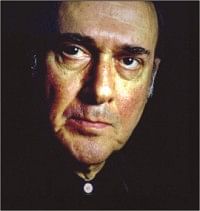<i>Harold Pinter: An absurdist playwright</i>

“I don't know how music can influence writing, but it has been very important for me... I feel a sense of music continually in writing, which is a different matter from having been influenced by it.”
--- Harold Pinter in Playwrights at Work
Harold Pinter achieved international success as one of the most complex post-World War II dramatists. His plays are noted for their use of silence to increase tension, understatement, and cryptic small talk. In 2005, Pinter was awarded the Nobel Prize for literature.
Pinter was born in Hackney, a working-class neighbourhood in London's East End, the son of a tailor. Both of his parents were Jewish. As a child Pinter got on well with his mother, but he did not get along with his father, who was a strong disciplinarian.
Pinter was educated at Hackney Downs Grammar School, where he acted in school productions. At school one of Pinter's main intellectual interests was English literature, particularly poetry. He also read works of Franz Kafka and Ernest Hemingway.
After two unhappy years Pinter left his studies at London's Royal Academy of Dramatic Arts. In 1950 Pinter started to publish poems in Poetry (London) under the name Harold Pinta. He worked as a bit-part actor on a BBC Radio programme, Focus on Football Pools.
After four more years in provincial repertory theatre under the pseudonym David Baron, Pinter began to write for the stage. His first full-length play, The Birthday Party, was first performed by Bristol University's drama department in 1957 and produced in 1958 in the West End. The play, which closed with disastrous reviews after one week, dealt in a Kafkaesque manner with an apparently ordinary man who is threatened by strangers for an unknown reason. Although most reviewers were hostile, Pinter produced in rapid succession the body of work, which made him the master of 'the comedy of menace.'
Pinter's major plays are usually set in a single room, whose occupants are threatened by forces or people whose precise intentions neither the characters nor the audience can define. The struggle for survival or identity dominates the action of his characters. Language is not only used as a means of communication but as a weapon. Beneath the words, there is a silence of fear, rage and domination, fear of intimacy.
In 1960 Pinter wrote The Dumb Waiter. With his second full-length play, The Caretaker (1960), Pinter made his breakthrough as a major modern talent, although in Düsseldorf the play was booed.
The Homecoming (1965) is perhaps the most enigmatic of all Pinter's early works. It won a Tony Award, the Whitbread Anglo-American Theatre Award, and the New York Drama Critics' Circle Award. In the story an estranged son, Teddy, brings his wife Ruth home to London to meet his family, his father Max, a nagging, aggressive ex-butcher, and other tough members of the all-male household. At the end Teddy returns alone to his university job in America. Ruth stays as a mother or whore to his family. Everyone needs her. Similar motifs -- the battle for domination in a sexual context -- recur in Landscape and Silence (both 1969), and in Old Times (1971), in which the key line is “Normal, what's normal?”
From the 1970s Pinter has directed a number of stage plays and the American Film Theatre production of Butler (1974). Closely associated with the director Peter Hall, he became an associate director of the National Theatre after Hall was nominated as the successor of Sir Lawrence Olivier. Pinter has received many awards, including the Berlin Film Festival Silver Bear in 1963, BAFTA awards in 1965 and in 1971, the Cannes Film Festival Palme d'Or in 1971, and the Commonwealth Award in 1981. In 1996 he was given the Laurence Olivier Award for a lifetime's achievement in the theatre. In 2002 he was made a Companion of Honour for services to literature.
Since the overthrow of Chile's President Allende in 1973, Pinter has been active in human rights issues, but his opinions have often been controversial. In January 2002 Pinter was diagnosed with cancer of the oesophagus. In his speech to an anti-war meeting at the House of Commons in November 2002 Pinter joined the world-wide debate over the so-called “preventive war” against Iraq: “Bush has said: 'We will not allow the world's worst weapons to remain in the hands of the world's worst leaders.' Quite right. Look in the mirror chum. That's you.”
In February 2005 Pinter announced in an interview that he has decided to abandon his career as a playwright and put all his energy into politics. “I've written 29 plays. Isn't that enough?”
Compiled by Cultural Correspondent

 For all latest news, follow The Daily Star's Google News channel.
For all latest news, follow The Daily Star's Google News channel. 



Comments